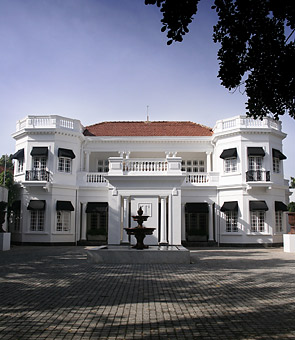
The Tintagel Hotel, Colombo, Sri Lanka.
On a quiet, leafy street in the loveliest neighborhood of Colombo, Dr. Lucien de Zilwa christened his new house Tintagel. It was 1930, during the height of British colonial rule in Sri Lanka, but de Zilwa didn't choose the name — that of King Arthur's legendary birthplace in Cornwall — out of a romantic attachment to England. He was a fashionable man, living in the most fashionable part of the city, and it was a vogue at the time for Colombo's local elite to give English names to their city villas.
His idyll would last only about a decade. The British military took over the house as a barracks during World War II, and after the soldiers left, de Zilwa sold the wrecked property to the Bandaranaike family. From then on, it was always their house, a political house — where Prime Minister S.W.R.D. Banadaranaike was shot on the veranda in 1959, where his wife and successor, Sirimavo, would raise a son and two daughters — one of whom, Chandrika, later served as the country's first elected female president.
The house has reclaimed its cosmopolitan history, however, in its unlikely rebirth as Paradise Road Tintagel Colombo, a luxury hotel and restaurant opened in 2007 by the Colombo entrepreneur Udayshanth Fernando. "I'm a very close friend of Sunethra Bandaranaike," says Fernando, referring to one of the three children who own the house together. Sunethra had planned to rent out the house to a foreign embassy, and she called him to help sell off the furniture. "I said, Why don't you rent it to me?" Fernando recalls. "She spoke to her brother and sister and there we went."
Tintagel has become one of the most unusual destinations in Sri Lanka, a boutique hotel that manages to honor the history of the house without letting the past dictate or dilute its modern, international sensibility. Fernando preserved the structure and restored the facade, the sweeping driveway and majestic carved wooden balconies and balustrades. But as soon as you walk through the grand pillared entrance, it's clear that Fernando has no colonial pretensions. There are no cane-backed chairs, no wicker, no ethnic kitsch or lovingly frayed Oriental rugs.
Instead you'll find high-backed upholstered sofas from Spain, a chandelier from the Netherlands, Chinese wedding cabinets, black laquer tabletops from Vietnam and Burmese art. The aesthetic is stark and assertive, some call it masculine. Instead of the rich pinks, reds and purples so common in the Subcontinent, here you'll find arrangements of pale green hydrangeas, and Nepali carpets in combinations of avocado and chocolate, indigo, ebony, mud and ivory. The local productions look back to Europe with a wink. The trompe l'oeil marble pillars in the interior dining room were painted by a Sri Lankan artist, a novice to the technique. Fernando himself designed the modernist steel beds, and had them made in Sri Lanka.
Colombo's establishment hasn't completely accepted Fernando's vision. After he signed the lease, Fernando faced some intense public criticism from traditionalists who thought the house should have been turned into a museum if there was no Bandaranaike family member occupying it. Museums in Colombo, however, tend to gather dust and Fernando is more interested in gathering people, and he's slowly building a following. The restaurant has become a favorite among the city's more adventurous diners, who come for the oxtail and marrow risotto, the yellowfin tuna enveloped in white radish or the prawn salsa heating up the cold soups.
Tintagel has also won praise for its fresh approach to the restoration of a historic property. Tintagel is not bound by "some notion of what the past might have been," says Channa Daswatte, one of Sri Lanka's leading architects and an associate of the late Geoffrey Bawa. "He's trying to create something that is of today, that is beautiful in its own right."
Demand for the hotel, however, has been slack. The Sri Lankan army and the Tamil Tigers are fighting again, officially ending a cease fire in the country's 25-year-old civil war last year. The violence has rarely affected tourists directly, but regular reports of bomb blasts have dampened tourism, forcing Fernando to offer his 10 luxury suites at discounted prices, beginning at $200 per night. He is optimistic, though, that peace will eventually come, and guests soon after. "Everything takes time, and I have patience."